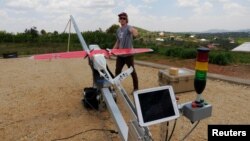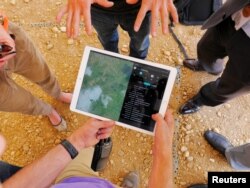Tanzania is set to launch the world's largest drone delivery network in January, with drones parachuting blood and medicines out of the skies to save lives.
California's Zipline will make 2,000 deliveries a day to more than 1,000 health facilities across the east African country, including blood, vaccines and malaria and AIDS drugs, following the success of a smaller project in nearby Rwanda.
"It's the right move," Lilian Mvule, 51, said by phone, recalling how her granddaughter died from malaria two years ago.
"She needed urgent blood transfusion from a group O, which was not available," she told the Thomson Reuters Foundation.
Malaria is a major killer in Tanzania, and children under age 5 often need blood transfusions when they develop malaria-induced anemia. If supplies are out of stock, as is often the case with rare blood types, they can die.
Tanzania is larger than Nigeria and four times the size of the United Kingdom, making it hard for the cash-strapped government to ensure all of its 5,000-plus clinics are fully stocked, particularly in remote rural areas.
The drones fly at 100 kph (62 mph), much faster than traveling by road. Small packages are dropped from the sky using a biodegradable parachute.
The government also hopes to save the lives of thousands of women who die from profuse bleeding after giving birth.
Tanzania has one of the world's worst maternal mortality rates, with 556 deaths per 100,000 deliveries, government data show.
"It's a problem we can help solve with on-demand drone delivery," Zipline's chief executive, Keller Rinaudo, said in a statement. "African nations are showing the world how it's done."
Companies in the United States and elsewhere are keen to use drones to cut delivery times and costs, but there are hurdles ranging from the risk of collisions with airplanes to ensuring battery safety and longevity.
The initiative could also ease tensions between frustrated patients and health workers.
"We always accuse nurses of stealing drugs," said Angela Kitebi, who lives 40 kilometers east of Dodoma. "We don't realize that the drugs are not getting here on time due to bad roads."






